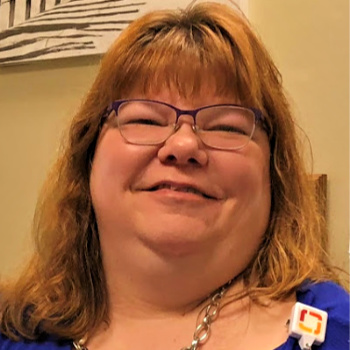By Rev. Kimberly Schmitt Holman
As a hospital chaplain, my days are typically spent listening to people talk about their hopes and dreams, their fears and concerns, their faith and how it helps them, or about their family, and even their pets. Those are good days. However, I also face difficult days where I am listening to families struggle with hard decisions, such as how to care for someone in the last days of their life. I have seen many tears fall when spouses, or children and grandchildren, are facing the most difficult decisions; whether or not to put someone on life support, or if and when to take them off.

In the face of the Covid-19 pandemic, these decisions are complicated by the fact that families cannot be constantly at the side of their loved one. In order to protect everyone, hospitals have established policies that do not accept visitors except under special circumstances. Families are now asked to make decisions for their loved one who they may have seen through a video chat. Under the best of circumstances, these conversations are difficult. Now, they are even more gut-wrenching as families struggle with the grief of not being able to see their loved ones before they make decisions about their life.
With Covid-19 changing our world as we know it, advance care planning has never been more important. On April 16, we will be observing National Health Care Decisions Day to raise greater awareness for the importance of having an Advance Care Directive that informs your family and your medical practitioners about your wishes for health care treatment. This gift of preparedness will save your family from making agonizing decisions during a time of crisis.
An Advance Care Directive is a written statement of a person’s wishes regarding medical treatment, often including a living will, made to ensure those wishes are carried out should the person be unable to communicate them to a doctor.
Another form of advance directives is a Physician Order for Life-Sustaining Treatment (POLST). If you have created a POLST document with your physician then you and your doctor have already agreed to your treatment plan moving forward. Your family can depend on these directives and know that they honor you by allowing your decisions to be fulfilled. More importantly, these documents give your loved one’s peace of mind by knowing your wishes so they can focus on supporting you during your illness.
It’s important that your Advance Care Documents are provided to your local hospital as well your key family member(s). If you typically use Piedmont for your care, they can be added into your medical record, and if you ever need to come to the hospital, your wishes will already be documented for our medical staff to see and follow. If you have questions about Advance Care Directives or POLST forms, please call 770-719-7037 or e-mail me at [email protected]. Our Patient Experience Team, led by Mary Hinely, is also available to assist you with and can be reached at 770.719.6139 or at [email protected]. Our experienced team is happy to assist our community with these important documents. Remember, as we observe National Healthcare Decision Day, give your family the gift of preparedness.
[Rev. Kimberly Schmitt Holman has been a chaplain at Piedmont Fayette hospital for the last ten years. She has served in churches in the Fayette County area for more than 20 years. She has a Master of Divinity degree from McAfee School of Theology at Mercer University and is currently working on her doctorate.]










Leave a Comment
You must be logged in to post a comment.